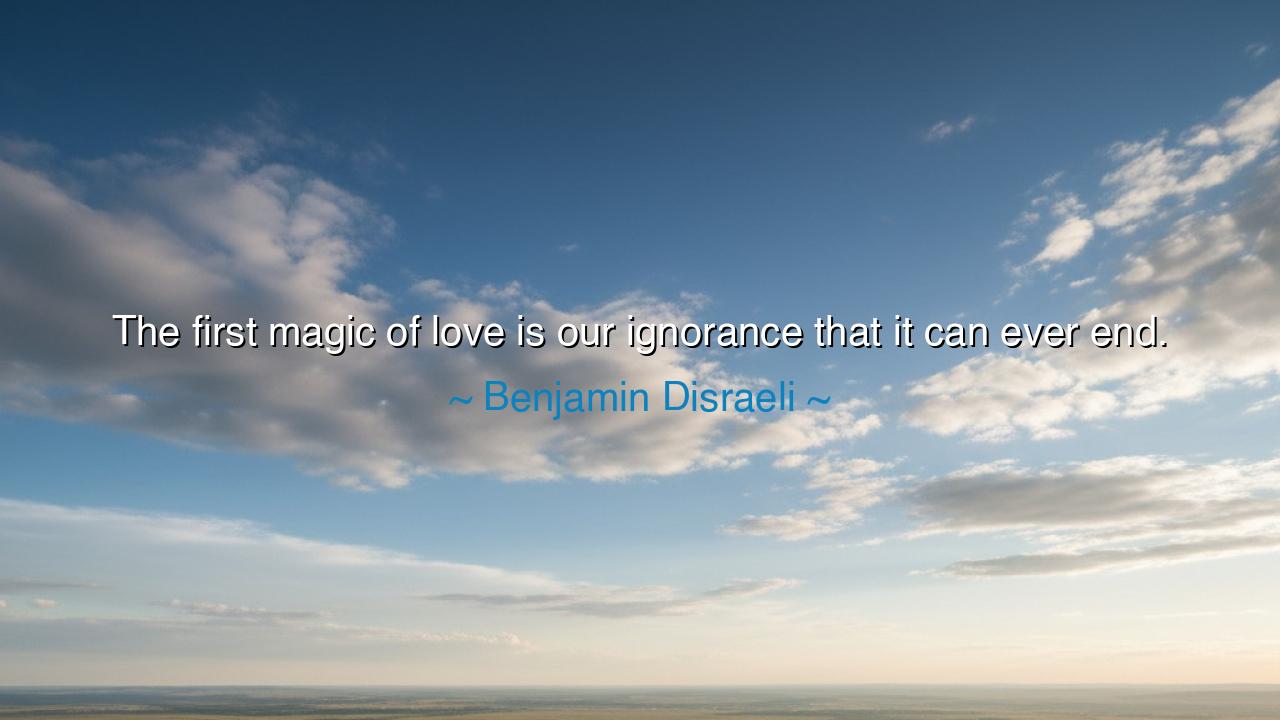
The first magic of love is our ignorance that it can ever end.






"The first magic of love is our ignorance that it can ever end." These words, spoken by the insightful Benjamin Disraeli, unveil a profound truth about the nature of love. The magic of love lies not in its longevity, but in its timeless illusion—the belief that love, once it blooms, will endure forever. This early stage of love, where it feels as though nothing could ever break its bond, is where the magic resides. Ignorance, in this sense, is not a lack of wisdom, but the innocence of believing that the intense feelings we experience will never fade. It is this naive belief that makes love feel like an eternal, unbreakable force, a power that sweeps us away and fills the world with light.
In the beginning, we are often blind to the fragility of love. Like a young sapling, it grows quickly and seems to stretch toward the heavens, never imagining the storm that might one day come to test it. The Greek philosophers spoke of love in many forms, but they too recognized that Eros, the passionate love of the heart, is often marked by an innocent ignorance. The early days of love are filled with the pure joy of connection, the bliss of shared moments, and the certainty that nothing will ever tear apart the bond. In this magical state, love is timeless, eternal—an endless river flowing with no end in sight. But Disraeli reminds us that this magic is in our ignorance, for all things in life—no matter how strong—are subject to the forces of time and change.
Let us recall the tale of Abelard and Heloise, whose love was a fierce, passionate affair in the heart of medieval Europe. Their love, once so full of promise and intensity, seemed destined to endure forever. Young Heloise, in her innocence, believed that their love would remain untouched by the world’s harsh realities. Yet, as is often the case, life intervened—Abelard’s castration and their separation broke the foundation of their love, transforming it from one of youthful magic to one of deep, sorrowful longing. Their love, which had once seemed so invincible, was subject to the cruel twist of fate. Abelard, in his later years, wrote of their love, not with bitterness, but with the knowledge that the initial magic was born from the ignorance of its inevitable end.
Disraeli's words also hold a timeless lesson. Ignorance, in this context, is not about being foolish or blind but about the nature of early love—the belief that it is invulnerable. This belief is what makes love so powerful, so transformative. When we love, we are swept up in a current that carries us away, and for a time, we do not see the dangers or obstacles ahead. This is the magic—the belief that love is all-encompassing, that nothing can disturb it. But it is only with time that we come to realize that love, like everything else in life, requires nurturing, and even then, it can be fragile, subject to the whims of fate and the changing seasons of the heart.
The story of Napoleon Bonaparte and Josephine is another example of the magic of love’s early stages. Napoleon, in his youthful infatuation and devotion to Josephine, believed that their love would remain unshaken, no matter what battles they faced. But as time wore on, the passion that had once burned so brightly began to wane. Napoleon’s ambition and Josephine’s inability to bear him children created a distance between them. Despite their deep connection, they were eventually separated, and Napoleon remarried. Yet, even in this separation, Napoleon's love for Josephine never truly faded. His longing for her and the realization that love had changed were the painful marks of his own disillusionment. The magic of his early love was overshadowed by the reality of its end.
The lesson that Disraeli imparts is one that we must all come to understand: love, in its earliest, most magical form, is blind to the possibility of its end. It is this innocence and naivety that give love its energy and beauty. But with time, we must come to terms with the fact that love is not immune to the forces of change. To truly love, we must not only cherish the magic but also accept the truth that love is fragile, and that it demands more than just passion—it requires commitment, understanding, and growth.
In our own lives, we must embrace both the magic and the reality of love. Do not be afraid of love’s ephemeral nature, but understand that it is through sustaining and nurturing that love can continue to flourish. Recognize that even in love’s impermanence, there is beauty and wisdom to be found. Cherish each moment of connection, but do not let the magic blind you to the work that love demands. For it is through awareness of both the magic and the reality that we can create lasting bonds—bonds that, while not immune to time, can still be deeply fulfilling and transformative.






AAdministratorAdministrator
Welcome, honored guests. Please leave a comment, we will respond soon